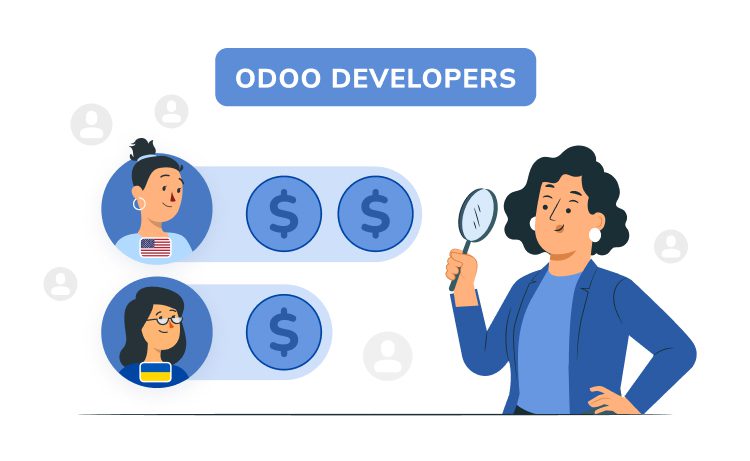
Why High Software Engineer Salary is Justified and Profitable



In the modern world, the IT industry occupies a leading position regarding personnel demand (approximately 500,000 open vacancies in the US only for Software Engineers). Now almost all types of equipment are supplied with processors that need their own software for processing commands, requests, and issuing results (launching workflows, if we are talking about industrial equipment). That is why every company that manufactures any kind of smart technology needs software engineers.
Glorium team conducted its own research on the IT and HR markets and identified the main requirements for specialists for the software engineer position. Today we will tell you what skills, talents, and qualities a representative of this profession should have, how much a software engineer’s salary is, and also how it depends on the region of work, experience, direction, and other factors.
Content
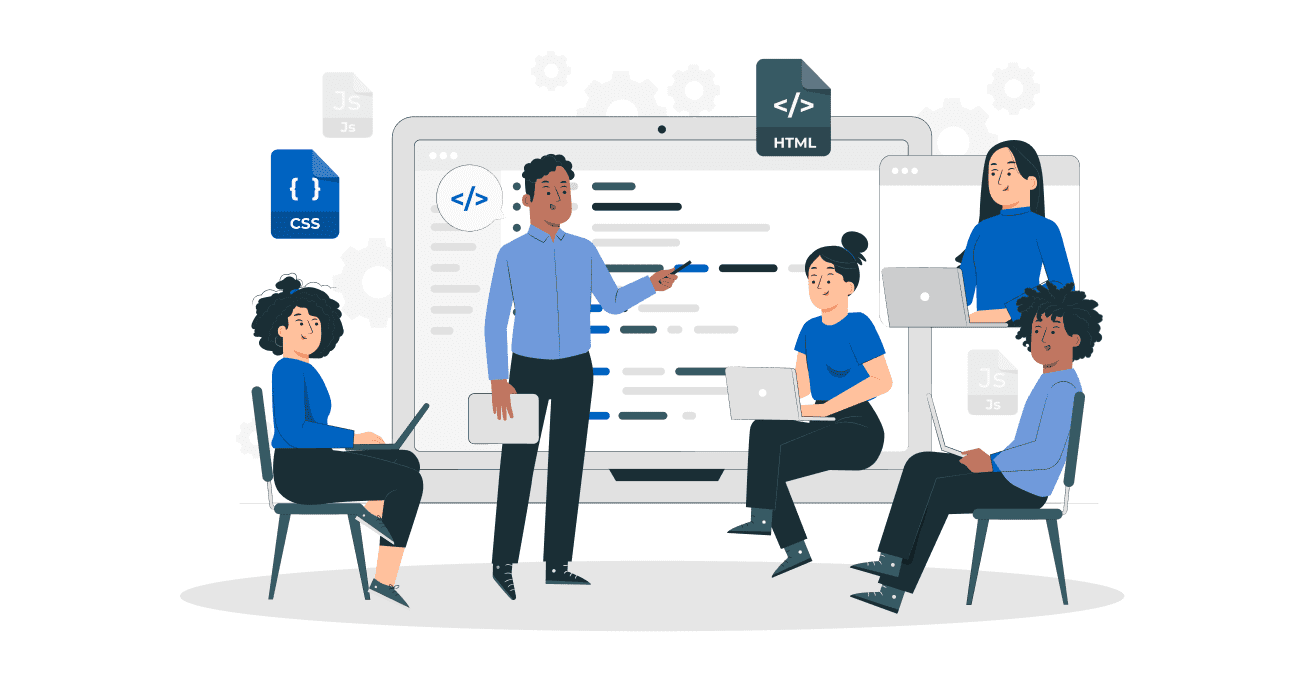
According to Indeed, Software Developers (also known as Software Engineers) are among the top 7 in-demand professions. The same list includes cybersecurity specialists, analysts, system and network administrators, and information systems managers.
All these professions are united by the fact that the requirements for duty performers are quite high and include:
In addition, there is a list of hard and soft skills for each specialization, which varies depending on the employing company. That is why, with a high software engineer salary, the requirements for candidates are so great that not everyone can handle them. Do you know what exactly the responsibility of a software engineer is?

We think you have already come across the definition of “software developer” more than once. A software engineer is the next step in the profession of a developer because it implies not only extensive experience in this field but also the skills of complex creation of programs, apps, and websites.
Actually, for this reason, the gap between software engineer salary and software developer salary is quite significant. Let’s take a closer look at the software engineer’s responsibilities. For this, we divide them into 2 groups: basic and additional.

Since a classical engineer’s range of skills and abilities is huge, we focus only on critical ones. They will best show the degree of professionalism of a typical representative of this profession.
Any work begins with planning. The IT industry is no exception because there are too many variables in it to implement during the work on the project or, even worse, after the release. That is why creating a plan and scope for software development is an essential part of an engineer’s responsibilities. Although they do not always perform this task alone, it is their experience and skills that help build the right strategy for working on the project.
The architecture of a digital product is not always limited to one of the frameworks. It’s often a branching system of dependencies and variables rooted deeper than the most remote back-end component.
The correct IT solution structure, whether an app or a full-fledged software package, helps to organize work on implementing each piece of a digital product. And it is the software engineer who knows best what an organic architecture and structure of the program should look like.
The design of a digital product is not just beautiful graphics superimposed on controls or the background of a program. No, this is a set of graphic solutions that not only decorate the interface but also make it visually attractive, convenient, and understandable for the end-user. Besides, the program’s performance on weak hardware, the adaptability of the interface, and even partially the controls’ functionality depend on the engineers’ chosen solutions.
When all the nuances have already been covered, and the customer has not yet come up with new “wishlists”, it’s time to design a roadmap for a digital solution. The complexity of this task is that it is necessary to consider many variables: the number of participants and team skills, the task complexity, the functionality, the amount of work, and the deadline. Usually, this work is delegated to the project manager and team leader, but the engineer is always involved in creating the roadmap.
Similar to the previous paragraph, an engineer is not a team leader or project manager, but they can replace both positions due to their experience and skills. Plus, at an early stage, only they can describe and explain how the future software solution should work or visualize the presentation on paper.
The main theme in software engineer salary, as well as in software developer salary, and even in full-stack engineer salary, is the direct development of a digital solution. Pay is affected by such indicators as the quality, volume, and cleanliness of the code, the number of bugs, and the speed of work on the project. Dependence is directly proportional – the better the work of a specialist, the higher the income.
An engineer is also responsible for the development control on a par with a team leader and a project manager. The experience and skills of an expert of this profile allow them, even at a glance, to identify problem areas of the code, too complex syntax or errors in functions. If necessary, they can submit a proposal to revise the development strategy or make adjustments to the sprints and tasks of individual performers.
Although sometimes this task is considered secondary for an engineer, it is one of the main ones. The fact is that even the concept of “Automated testing” implies the participation of an engineer in finding errors. Their tasks as a tester: creating automated self-sufficient scripts written in the development language and monitoring the smooth testing, as well as analyzing their own reports and cases of QA specialists.
Based on the testing results, the bugs are prioritized for fixing. An engineer often takes a direct part and personally eliminates critical problems and significant errors that directly or indirectly affect the performance of one or more functions/entire system.
All functions, elements, and interface are comprehensively tested after the final development cycle and lasts long enough for the expert to evaluate the system performance and decide on the finalization of the project.
Typically, an engineer, testers, a product owner, and a limited group of target customers are involved in the specialist role. Based on this testing stage’s results, the digital solution’s bug degree and the need to delay its release to the market are determined.
Documenting the development process and describing the principles of key functions operation and interface elements, including the user manual, lies entirely on an engineer. How easy it will be to scale the project in the future and how quickly consumers will master it depends on the correct presentation of information. That is why documentation should fully cover the work on the project, key functions, and examples of using this IT solution.
Also, it will help new development participants quickly understand the work’s essence if it is necessary to replace someone from the team in the middle of the cycle.
To summarize, the software engineer plays a key role in development. They are given the honor, along with the team lead and project manager, to present a digital product to the customer and, in some cases, even to the public (remember the practice of the mastodons in the field: Apple, Google, Amazon, Microsoft).
Returning to the 10th point of this list, we repeat. The software engineer, better than all the other participants, understands the principle of operation and the app’s architecture, which means that they can play the role of technical support in especially difficult cases. And, their documentation will help even beginners to work for their staff software engineer salary.
In IT, wages are calculated according to their own formula, which includes factors such as the number of working hours, productivity, complexity of projects, and even the work model. We offer you a brief tour into the bureaucracy maze associated with advanced IT specialists’ salaries.
As already known, several types of cooperation differ in the place of work, requirements for the performer, communication methods, and responsibilities. There are three main models:
In the long run, the first two options win for several reasons. For example, a full-time employee is more motivated and interested in the project’s success than a freelancer. But in terms of salary, these models lose. Typically, companies invest in equipment even for remote performers to increase comfort and, accordingly, efficiency and work productivity, sometimes offsetting the cost of renting a house, moving, etc. This also affects the cost of labor, not much, but reducing the contractor’s rate.
The outsourcing model becomes necessary only if:
Pay attention to the first matter. What do you think, how much higher is the software engineer salary for such a contractor than for a full-time one? Approximately 10%-20%.
The salary gap between Trainee and Senior can be as high as 24%, according to GlassDoor. For example, in the US, the average annual salary of a Trainee Software Engineer is about $110,000, but a Senior Software Engineer already has more than $136,000 per year. These figures refer only to full-time performers and include the basic rate or bare rate, i.e., without allowances, bonuses, vacation pay, etc.
Example of rate increases (Taken from GlassDoor)
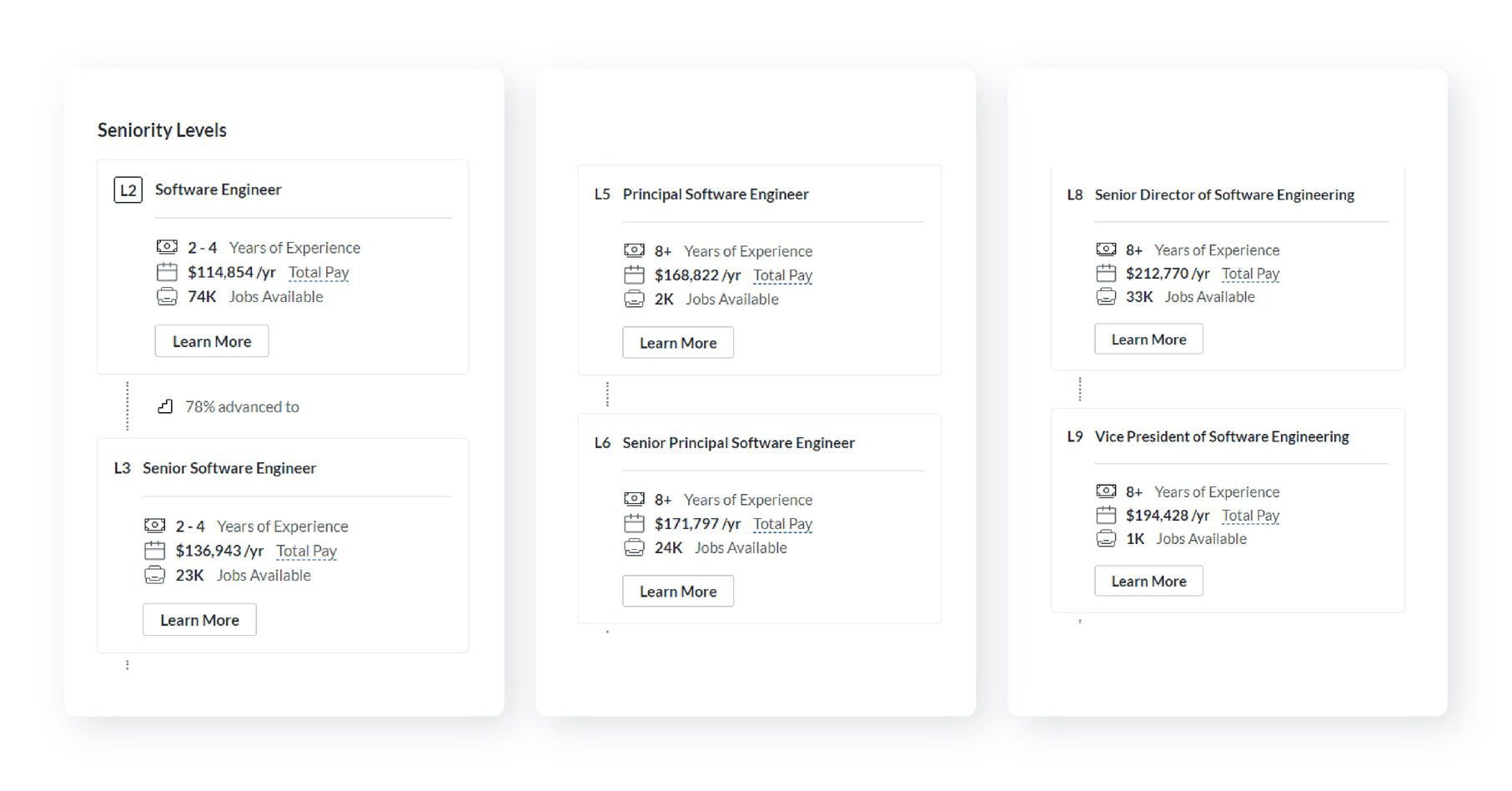
Similar to the gradation by skills, the performer’s salary directly depends on work experience and length of service in the current company. The longer an expert holds a position and effectively performs all the management tasks, the higher the rate and additional bonuses they can count on. The IT industry stands out for its loyalty to employees because you can only receive a monthly salary bonus for a particularly successful project in this area.
As mentioned in the article, the peculiarity of Software engineers is that they can combine the responsibilities of different positions while working. Like replacing a team lead, a project manager, or an ordinary employee: a developer, designer, or tester, depending on skills and work experience. Such multi-operation directly proportionally affects the final salary, increasing it as much as the company can afford.
Among key factors influencing software engineer salary are company registration region or geolocation. For example, the rate of a specialist from Eastern Europe is much lower than a similar expert from Western Europe, which is less than that in the USA.
Asian countries have their own labor assessment system, but even there, the salary range can compete with the European one, although the quality of work from the Asian and Indian regions can be significantly inferior to competitors from Europe, whose responsibility and skills are comparable to those in the USA.
This is what the regional outsourced developer hourly price range looks like:
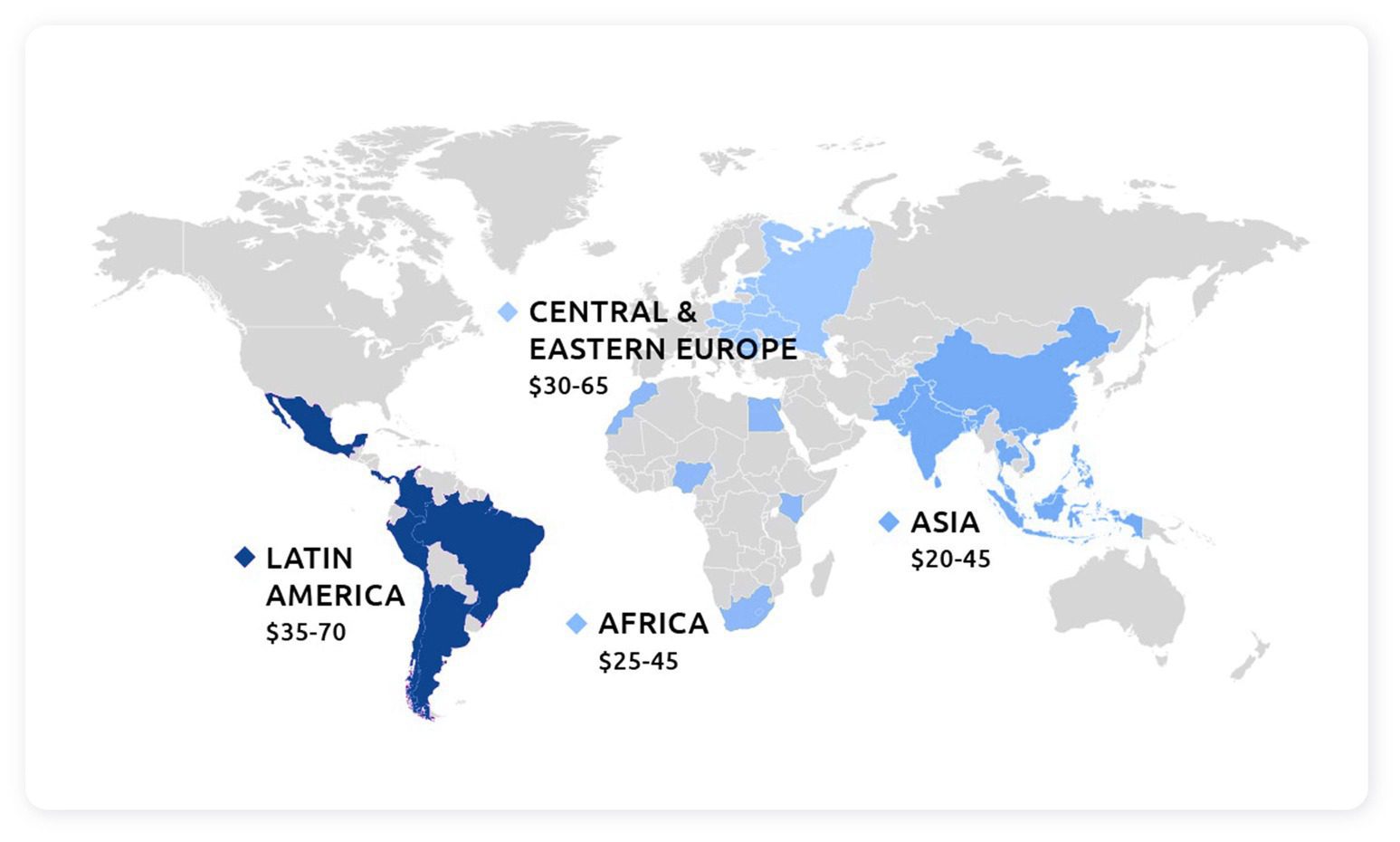
And another comparison showing the real annual income of US and European specialists:
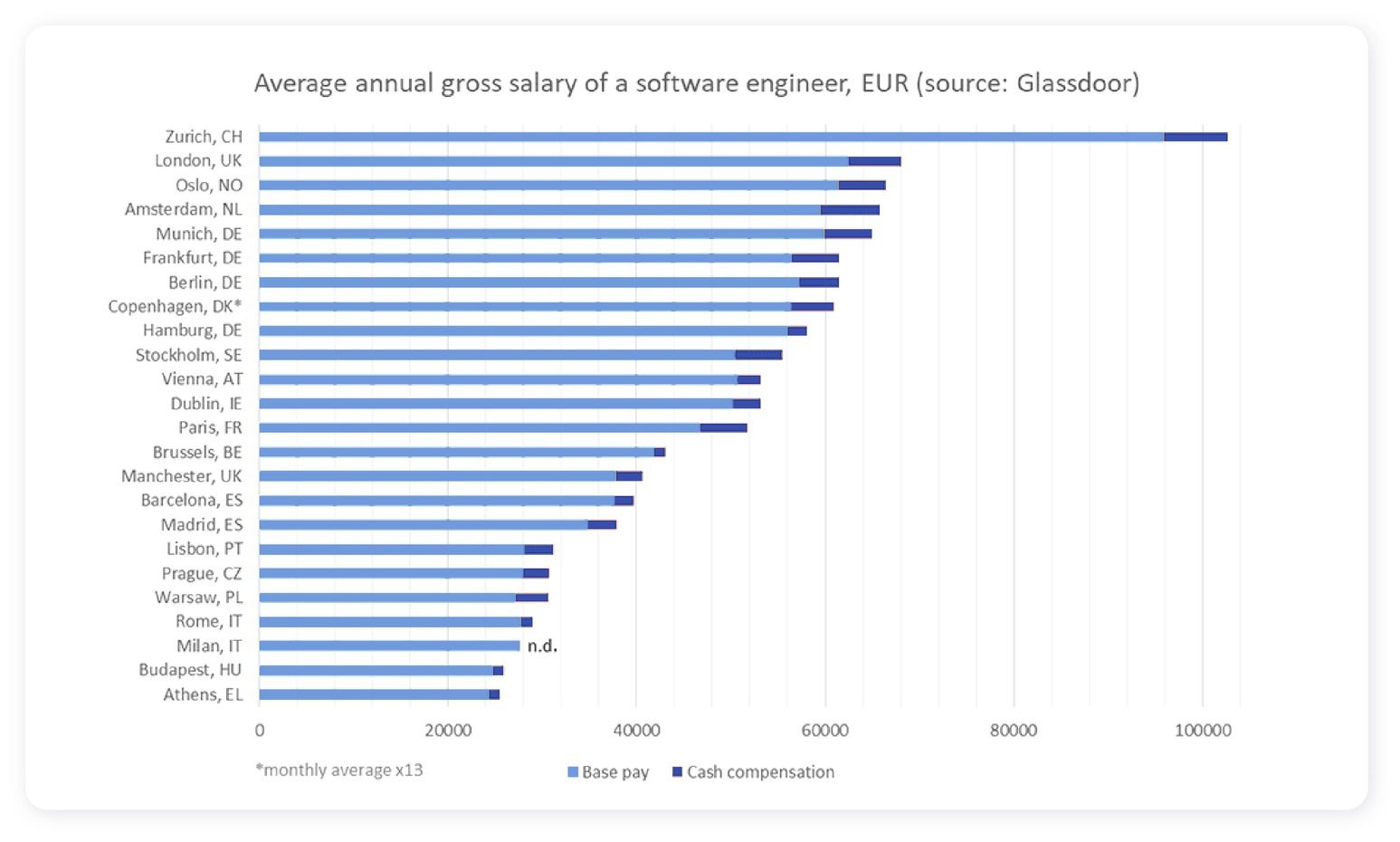
Source: 4DayWeek, infographic based on GlassDoor data.
It is slightly incorrect to apply the concept of specialization to Software Engineer because, in fact, an expert of this level is usually familiar with most modern popular technologies, development languages, frameworks, tools. However, some categories of skills are ranked higher, and their exclusivity is measured by the number of experts who have mastered the profile skills. Here the dependence is inversely proportional: the more specific the technology or task, the more expensive it will be to hire a specialist.
In addition to the above factors, there is a whole system for evaluating the work of IT specialists, which directly affects the software engineer salary. As you probably know, the basis of the development cost is the cost of one specialist for one hour. It takes hours to weeks to create each feature. Accordingly, the wider the digital product functionality, the more the developer, engineer, designer, etc., will get.
For example, let’s take the basic development of a web app, for which we will hire a specialist from Eastern Europe. Since we need to calculate full-stack engineer salary, we will estimate based on the involvement of only one person in the project. So, we need to implement standard features when developing a trading app, which includes:
All this will require about 400 hours of work (about 2 months), provided that the project is developed based on a ready-made CMS. At a bare rate, this will result in $18,000 + considering the project’s complexity, additional payments for deadlines, etc.
If we talk about teams, then pricing is different: a price list for services appears, and developers’ rates are integrated into the overall complexity of the project, their role in it, etc.
We have analyzed the vacancy statistics and reviews on GlassDoor and are ready to share with you the results of our “salary research”. Since the price range, although not much, is different, we decided to present you with our own top highly paid engineering positions in the USA.
All in all, as we can see, all positions in the top are very profitable for specialists and allow them to earn more than enough money. The gap in the price range is due to the specifics of the job and the difference in the number of responsibilities, so we recommend that everyone who wants to earn more money improve their skills and learn new ones. This will help in the future to reveal your potential as an expert in IT and get a good, high-paying position.
It all depends on the abilities and desire of the individual. For some, career growth takes months, while for others, it takes years. On average, it takes about 5-7 years to get promoted from Trainee and Junior to Senior, as long as you work hard to improve your skills while being involved in a particular field.
Yes, experience plays a key role when considering a promotion decision. The usual requirement for getting the status of Middle or Senior is more than four years of experience in similar positions. Of course, different companies treat the concept of experience differently, but only in rare, exceptional cases are talented newcomers given a salary of the Middle or Senior level from the first months in the company.

There are a total of three skill levels typical of all IT professions: Junior, Middle, and Senior. Trainee gradation implies that the performer has not yet reached the Junior level and is actively learning while working (internship). Many companies find it profitable to hire newbies and train them from the ground up, developing the necessary skills and abilities in a particular area. This tactic is justified when the organization needs:
These factors contribute to the employment of promising newcomers in large companies, where they get better training and internships, while improving the quality of services. So Trainee is gradually transformed into Junior, a skill level, which already implies certain duties and responsibilities for the specialist.
A junior specialist often has only basic experience with popular frameworks, knows how to develop IT solutions in 1-2 languages, and is familiar with the principles of creating databases. In essence, such a performer can fully execute the duties of a Software Engineer, but with several limitations. For example, their seniors will always supervise their work, teaching them new methods of creating IT solutions. In standard conditions, upgrading to Middle takes about two years, adjusted for the specialist’s enthusiasm and mindset.
According to the Dreyfus model, mid-level specialists are competent in advanced work tasks. For example, code testing, development using different languages and frameworks, and sometimes can even be a team leader. The Middle level means that a person puts a lot of effort into learning new techniques, programming languages, and the specifics of the field, which makes this person in high demand in many IT companies. On average, it takes about four years for such a specialist to grow to the Senior level.
The highest skill level, competence in all popular kinds of development, and hundreds of closed projects. This is how an expert in software development and engineering can be described. Such specialists often act as mentors for newbies, lead development projects, and quality assurance department. And although there is no limit to perfection, Senior is considered the peak of excellence, as evidenced by the Software Engineer Salary, which in some cases can compete with Staff Software Engineer Salary.

With a Software Engineer Salary of $110,000, the responsibilities and demands of the position are very high. A specialist at this level requires advanced skills in many areas of the IT field, particularly development. We at Glorium Tech know this because we have the best talent in the field, which positively affects the quality of our digital solutions. By the way, if you need unique advanced apps, services, or complete systems, Glorium Tech is at your service!
High salaries, career prospects, honor, and respect of colleagues at work.
Depends on experience and skills. Usually, the “bare” rate is about $90,000 a year, but with bonuses from the company, it goes up to $110,000. Depending on experience, the income level limit can go beyond $140,000.
